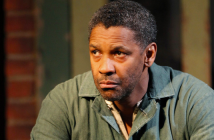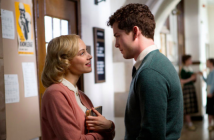
Three things stand out to me when I think about Hacksaw Ridge, Mel Gibson’s fifth directorial effort starring Andrew Garfield as Desmond T. Doss, the first Conscientious Objector to be awarded the Medal of Honor. First and foremost, Gibson’s depiction of the Battle of Okinawa features some of the most impressively executed war scenes ever put to film. Secondly, Andrew Garfield gives a compelling performance, and I’m eager to see where his post-Spider-Man career takes him. Lastly, Desmond Doss’ commitment to his ideals is quite impressive. The inherent problem with Hacksaw Ridge, which admittedly is nothing close to an unwatchable film, is that Doss’ journey shouldn’t feel like an afterthought by the time the credits roll.
Hacksaw Ridge is at its strongest during its middle act, in which we watch Desmond Doss go through the hells of boot camp. Because of his peaceful sentiments (he refuses to complete rifle training or even touch a gun), he is bullied relentlessly and given the worst jobs. It’s an interesting choice to refrain from having Desmond explain his motivations until this point in the story. It’s at this point in the film that Desmond actually feels like a layered character (the first act of the film ventures dangerously close to Forrest Gump territory), a facet bolstered by Garfield’s assured and involving performance. In one of the film’s more competently written moments, Garfield delivers an effective speech during his court martial about why he enlisted as a medic even though he didn’t believe in killing. The scene works wonders, building on the emotion and story laid out leading up to it. I was actually invested in what would happen when Dawson shipped off for combat.
Once the camera pans away from the hilariously G-rated wedding night scene to transition to the grimy war scene, the film almost feels like a different movie. Doss, the character we’re supposed to be rooting for, becomes sidelined in lieu of depicting battle scenes. Gibson and screenwriters Andrew Knight and Robert Schenkkan shift their focus so far away from Desmond and his journey that we’re treated to terribly out-of-place sequences from the enemy’s point of view.
It’s impossible to fault Hacksaw Ridge for its war scenes. Mel Gibson has a very assured hand as a director. Taken on their own, these scenes are incredible, depicting war in a way that other movies haven’t. That being said, the rest of the film feels very familiar, old-fashioned to a fault. The combination of familiar tropes (the crazed drill sergeant, the trucks of dead and wounded soldiers driving past the fresh-faced trainees) with the film’s strange choice to short-change Doss’ arc just highlights how carried away and distracted Gibson got in the film’s final scenes.
Once the battle scenes conclude, the main focus of Hacksaw Ridge shifts to Desmond’s incredibly heroic act of bringing multiple men to safety without using a gun. The directorial finesse that Gibson showed in the earlier scenes vanishes here. There’s no sense of direction or placement in these scenes, and the climax is so rushed that any goodwill and investment built up by the previous scenes dries up completely. Any remaining investment is eviscerated completely by footage that plays during the credits of the real Doss recounting events you just spent two hours watching unfold.
I’m sure many will enjoy Hacksaw Ridge, and they have every reason to do so. I even did, to a point. There’s a lot to admire in Mel Gibson’s film, but next to nothing to love. It’s a well-intentioned story told with steady direction. Hugo Weaving gives one of his best performances as Tom Doss, a man who has seen the tolls that wars take and has no desire for that to happen to his family again. Vince Vaughn does seem a bit out of place, but he gets some of the film’s best lines and delivers a pretty great performance. Sam Worthington and Luke Bracey are quite good here, and Hollywood would do itself a favor by giving them more roles. Speaking of needing more to do don’t expect any depth to either Rachel Griffiths’ mother character or Teresa Palmer’s love interest beyond the stereotypical wringing of the hands. Hacksaw Ridge is a film with mixed-up priorities, with a subject deserving of a better, deeper film.
There's a lot to admire in Mel Gibson's film, but next to nothing to love. It’s a well-intentioned story told with steady direction. Hacksaw Ridge is a film with mixed-up priorities, with a subject deserving of a better, deeper film.



